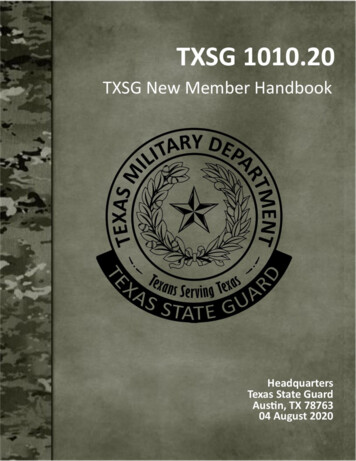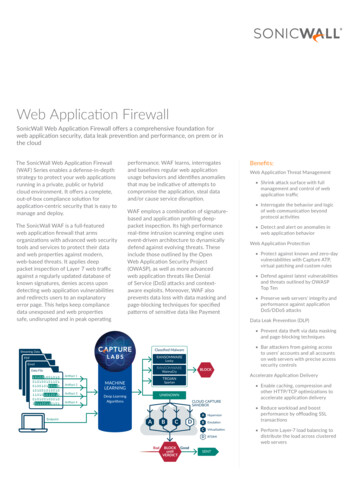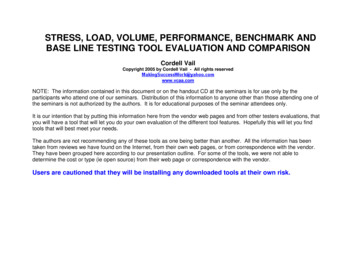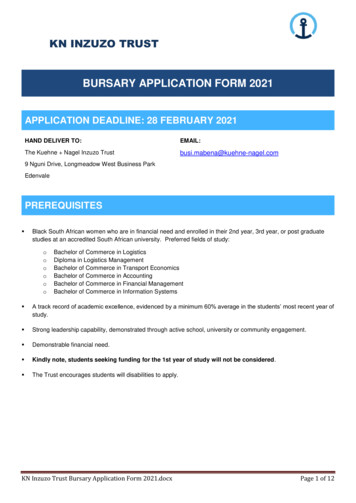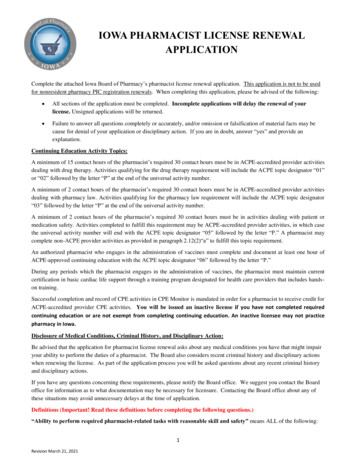
Transcription
Naturalization GuideFrom application toswearing-in andbeyondCUNY.EDU/CITIZENSHIPNOW October 2018 Third Edition
Naturalization GuideDisclaimer:The materials in this guide are for informational purposes only. The useof information contained in this guide does not constitute legal advice.Any reliance on the information contained herein is solely at the reader’s own risk.We make the best effort to include up-to-date and accurate information in all ourpublications. However, immigration laws, forms, fees, regulations, proceduresand policies are constantly changing, sometimes even retroactively, and theinformation contained herein may not necessarily be complete or correct onthe date of publication. Please consult an authorized immigration law expertbefore making any decisions or taking any actions that might affect yourU.S. immigration status.Reprinting:Your organization can reproduce copies of our publications for furtherdistribution to employees, members or students as long as no changes aremade and credit is given to CUNY Citizenship Now! Commercial use, sale ordistribution is prohibited.Revised: October 2018
Naturalization GuideMESSAGE FROM ALLAN WERNICKREAD ME FIRST. 1A. STEPS ON THE PATH TO NATURALIZATION. 3B. BASIC ELIGIBILITY REQUIREMENTS. 7C. DUAL CITIZENSHIP. 15D. REQUESTING A FEE WAIVER OR REDUCED FEEFOR YOUR APPLICATION. 19E. SUBMITTING YOUR FORM N-400 APPLICATION. 25F. AFTER SUBMITTING YOUR APPLICATION: NEXT STEPS. 29G. YOU ARE NOW A U.S. CITIZEN. 35H. ADDITIONAL RESOURCES. 39I. STUDY MATERIALS. 41
CUNY Citizenship Now!101 W. 31st Street9th Floor, Room 900New York, NY 10001www.cuny.edu/citizenshipnowDear Participants,CUNY Citizenship Now! prepared thisNaturalization Guide to give legalpermanent residents an overview ofthe laws and procedures they need toknow to become a U.S. citizen. Besidesadvice on naturalizing, the Guide offersinformation on how to find low-costCivics and English as a Second Language(ESL) classes, and authorized immigration services providers.We hope you find the Guide useful to you in your quest to becomea U.S. citizen. If you have any concerns, let us know.We are here to help.Cordially,Allan Wernick, Esq.Director, CUNY Citizenship Now!
READ ME FIRST!There are many things to consider before submitting yourapplication for United States citizenship. The list below reflectssome of the issues that could prevent you from naturalizing.This guide contains detailed information about the warningsin the list below. Be sure to speak with an authorized immigrationlaw expert if: You have ever been arrested or had any contactwith law enforcement. You have ever lied to government officials, immigrationofficers, or officers at a consulate abroad. You married someone only to get your green card. You have ever failed to pay spouse or child support. You are a male who lived in the United States at anytime between your 18th and 26th birthdays and didnot register with the Selective Service. Since becoming a permanent resident, you have spenta lot of time outside of the United States, especiallyif trips lasted more than six months at one time. Since becoming a permanent resident, you failed tofile an income tax return when required to do so. One of your parents became a U.S. citizen beforeyou turned 18 years old. You may already be aU.S. citizen.As part of the application process, U.S. Citizenship andImmigration Services (USCIS) will review your entire immigrationand criminal history. This may be risky for some people. If youhave any questions about whether you are eligible to applyfor citizenship be sure to speak with an authorized immigrationlaw expert.1
A. STEPS ON THE PATHTO NATURALIZATIONNaturalization is the process where a person born outside the UnitedStates voluntarily becomes a U.S. citizen. There are five basic steps tobecoming a naturalized U.S. citizen:1. Meet the eligibility requirements2. Complete and file Form N-4003. Have fingerprints and photos taken4. Pass interview and citizenship test5. Attend a swearing-in ceremonyCitizenship Now! can help determine if you meet the eligibilityrequirements and can assist you with completing your application.We can also help you complete a fee waiver or reduced fee application ifyou qualify.This guide also contains information about the next steps after weassist you with preparing your application, such as materials to helpyou prepare for the interview and to study for the civics test.4
THE PATH TOCITIZENSHIPN-400RECEIPTNOTICE*1Make sure youare eligible2 Complete andmail yourapplication3 USCIS sendsN-659*ANDI-797C*6 USCIS sends youyou an I-797C*Notice of ActionI-797C*a date for yourinterview and alist of what to bring5 Have yourfingerprints andphoto taken4 USCIS sends youa "BiometricsAppointmentNotice"N-652*ANDN-445*7 Attend yourinterview9 Attend youroath ceremonythe interviewresults and, if youpassed, a noticefor the oath ceremony8 USCIS sends youCongratulations, you are a U.S. Citizen!*You will find these numbers on the upper right side of the documents you receive fromUSCIS. The steps shown here are for applications submitted by mail. You can also file yourapplication online at my.uscis.gov5
B. BASIC ELIGIBILITY REQUIREMENTSTo Naturalize You Must:Be a lawfulpermanentresident (LPR)Be at least 18 at the timeyou file your applicationMeet the continuousresidence andphysical presencerequirementsNYAZHave lived for at leastthree monthsin the State or USCISDistrict where youwill file your application*Speak and writebasic EnglishBe a person ofgood moral characterCivics TestBe willing totake the oath ofallegiance* Students may apply for naturalization either where they go to school or wheretheir family lives if they are still financially dependent on their parents.Pass a test of U.S. Historyand Government (Civics)1. Continuous Residence RequirementYou must show you have continuously resided in the United Statesas a lawful permanent resident (LPR), for at least five years beforenaturalizing. If you are married to a U.S. citizen, you can naturalizethree years after becoming a permanent resident if you are married toand living with the same U.S. citizen for the entire three-year period.Your spouse must have been a U.S. citizen for the three-year period aswell. (Special rules apply to active military members and some veterans.)Continuous residence does not mean you must have been in the United8
States without ever leaving during that time. It means that duringthe five or three-year period all of the following were true: You did not abandon your permanent resident status. You maintained your primary place of residence in the UnitedStates. You did not stay outside of the United States for one continuousyear (365 consecutive days) or more. An absence of one yearin most cases automatically breaks continuous residence.2. Physical Presence RequirementYou must be physically present in the United States for half of thefive or three-year period before applying to become a citizen. You willneed to list your trips outside the country and count the total numberof days you have spent outside the United States during the five orthree-year time period. That means the total number of days you spentoutside the United States cannot be more than 913 days in the lastfive years (or 548 days in the last three years). There are some exceptions.3. Good Moral Character RequirementTo naturalize, you must prove that you are a person of good moralcharacter. If you have a criminal record, failed to pay required spouse orchild support, have had problems with drugs or alcohol, been involvedin illegal gambling or prostitution, failed to pay your taxes, willfullyfailed to register with the Selective Service, or have lied to immigrationofficials to gain immigration benefits, it’s possible you will not meet thegood moral character requirement.Parking tickets, disorderly conduct convictions, and many other minoroffenses usually will not prevent you from proving you have good moralcharacter. USCIS may argue you do not have good moral character ifyou have repeated convictions for minor violations.If you ever lied to get public benefits, it is possible you will not be ableto show good moral character. However, you can naturalize even ifyou have been receiving means-tested public benefits, as long asyou were entitled to receive them. This includes benefits such asfood stamps or Medicaid, which are available only to individuals whoseincome is below a certain level.9
a. Criminal ActivityIf you have ever been arrested, charged or convicted of a crime(even abroad), you need to get information about your criminal recordbefore you apply to became a citizen. Go to the Clerk of thecourt in the county/borough/city where you were arrested/chargedand get a Certified Court Disposition for every arrest or charge.A Certified Court Disposition is an official court document thatshows the current status of a case or its final outcome.Ordinary traffic stops or tickets will not prevent you from naturalizing.You do not need to submit evidence of these minor offenses unless atraffic incident was alcohol or drug related or caused serious injury toanother person. You do not need to submit documentation for trafficfines and incidents that did not involve an actual arrest if the onlypenalty was a fine of less than 500 and did not result in points on yourdriver’s license.If you have been convicted of certain serious crimes called aggravatedfelonies, you may be permanently barred (prohibited) from naturalizing.Some crimes may even cause immigration authorities to remove youfrom the United States, take away your green card or may have otherserious consequences. Speak to an authorized immigration law expertfor more information.b. Child SupportIf you purposely fail to meet your child support obligations, USCIS willfind that you are not a person of good moral character and may denyyour application for naturalization. Child support refers to financialsupport you provide to your children when they do not live with you,even if they live abroad.c. Selective Service RegistrationMales living in the United States who are between 18 and 26 years oldmust register with the Selective Service System. This includesundocumented men, permanent residents, and citizens. The requirementends once the applicant reaches the age of 26. The registrationrequirement does not apply to men living in the United States in lawfulnonimmigrant status, such as F-1 student visas or H-1B temporaryworker visas.If you did not register with the Selective Service System and you are not26 yet, you must register before you file your naturalization application.10
You can get a Selective Service registration form at your local post officeor you can register online at www.sss.gov.If you are 31 or older at the time you file your N-400 application(29 or older for the spouse of a U.S. citizen), you can naturalize even ifyou failed to register. Even though form N-400 says you must submitdocumentation about your failure to register, it is not required fromapplicants who have already turned 31 (or 29 if you are married to aU.S. citizen).If you are between the ages of 26 and 31 years old (or 26 and 29 yearsold and married to a U.S. citizen) you can naturalize even if you failed toregister. You must prove that your failure to register was not “knowingand willful” by submitting a letter explaining why you did not register.If you are claiming that you were unaware of your obligation to register,you must also submit a Status Information Letter from SelectiveService stating that the agency never contacted you. You can submitthe explanation letter and the Status Information Letter either with thenaturalization application or at the time of the naturalization interview.Instructions for requesting the Status Information Letter are online atwww.sss.gov/instructions.html.How to Check if You AreRegistered with the Selective ServiceThere are two ways to check if you are registeredwith the Selective Service System and to obtain yourregistration date and number. Call 888-655-1825 or checkthe website at www.sss.gov. Have your date of birth andSocial Security number available. To speak to a SelectiveService representative, call 847-688-6888. You will need toinclude this information on your N-400 application.4. Civic Knowledge RequirementAt your interview you must show a basic understanding of U.S.history and government (civics). This means you must answer sixout of ten questions correctly from a list of 100 questions providedby USCIS.11
5. English Language Requirement and ExemptionsYou must have a basic knowledge of English in order to become a U.S.citizen. However, certain applicants may be exempt from the Englishlanguage requirement because of their age and length of time they havebeen a permanent resident. You are exempt from the English languagerequirement if at the time you are filing your application you have beena permanent resident for at least 20 years and you are 50 years of age orolder (the 50/20 rule.) If you have been a permanent resident for at least15 years and you are 55 years of age or older (the 55/15 rule), you arealso exempt from the English language requirement. If you are exempt,you must still pass the civic knowledge test, but USCIS will test you inyour native language. For a list of the vocabulary to prepare for thereading and writing sections of the test, go to section I. Study Materials,pages 54 and 55 of this guide.If you are 65 years of age or older and you have been a permanentresident for at least 20 years (the 65/20 rule) at the time you submityour application, you may take the simplified civics test (and have12
your interview in the language of your choice). You will needto answer six out of ten questions from a list of 20 questions.For a list of the 20 civics questions, go to section I. Study Materials,pages 52-53 of this guide.6. Medical ExemptionsIf you cannot learn or remember due to an impairment or disability,you can apply for an exemption from the English and/or civics test.Your licensed medical doctor, psychiatrist or clinical psychologist mustproperly and completely fill out Form N-648, Medical Certification forDisability Exceptions, with a clear and detailed explanation of thedisability and the inability to take the English and/or civics test. Thiscompleted form is submitted with your Form N-400, Application forNaturalization. USCIS will decide whether to approve or deny yourrequest at the interview.If you need an accommodation such as a sign language interpreter,large print materials, or extra time for the exam, be sure to note this onyour application.7. Age and Willingness to Take the OathThe final step in becoming a U.S. citizen is taking the oath of allegianceto the United States Constitution and form of government.If you are unable to understand or are unwilling to take the oath becauseof a disability or medical condition, you can apply for a waiver of theoath requirement. A request for a waiver of the oath can be submittedalong with the N-648 form, but a detailed written evaluation completedby your medical doctor or clinical psychologist in addition to otherdocumentation may be needed. The evaluation must explain why andhow you are unable to understand the Oath of Allegiance. You must alsohave a court appointed guardian who can take the oath on your behalf.a. Allegiance to the U.S. Government RequirementIt is not until you take the Oath of Allegiance that you actually becomea citizen. Part of the oath is giving up allegiance to other countries.Some countries will still allow you to keep your citizenship after youtake the oath (see section C. Dual Citizenship of this guide.) To checkyour country’s rules on dual citizenship, contact your country’s embassyor consulate in the United States.13
You must also demonstrate your allegiance to the United States by beingwilling to either bear arms on behalf of the United States or performsome form of military service or civilian work of national importance.There are some exceptions to the oath requirement for individuals withdeeply-held beliefs against military service.b. Exceptions to the Requirements: Veterans and Those inMilitary ServiceIf you are a U.S. military veteran or currently serving in the Army, Navy,Air Force, Marine Corps, Coast Guard, or other qualifying member ofthe Armed Forces, you may be able to naturalize without meeting thenormal residence and physical presence requirements. You are alsoexempt from paying the application and biometrics (fingerprinting) fees.Individuals presently serving in the U.S. military during a time of warqualify for naturalization regardless of immigration status. Go to www.uscis.gov/military for more information.14
C. DUAL CITIZENSHIPSpecial thanks to the volunteers at Bloomberg L.P. for researching andupdating these lists. These lists last revised on October 2017.The countries below have laws on dual citizenship (being a citizenof two countries at the same time). Many countries have restrictionsregarding losing or acquiring additional citizenship. Please note notall countries are listed below. For more information about losing yourpresent citizenship when you naturalize as a U.S. citizen, speak witha representative of your government. Even if your country allowsdual citizenship you are required by U.S. law to use a U.S. passportto leave and re-enter the United States after becoming a U.S. citizen.The countries marked with an asterisk (*) have restrictions or exceptions.1. Countries that Generally Allow Dual CitizenshipAlbaniaAngolaAntigua osBelgium*BelizeBeninBoliviaBosnia andHerzegovinaBrazilBulgariaBurkina FasoBurundiCambodiaCanadaCape VerdeChadChileColombiaCosta RicaCroatia16CyprusCzech *EcuadorEgypt*El alyIvory iusMexicoNauru*Netherlands*New ZealandNigeria*PakistanPalauPanama*Papua tar*RomaniaRussia*RwandaSamoa*Saudi ArabiaSenegalSierra LeoneSloveniaSouth Africa*South Korea*Spain*Sri Lanka*St. Kitts and NevisSt. LuciaSt. Vincent*SudanSwaziland*Sweden
SwitzerlandSyriaTaiwan*TogoTongaTrinidad &Tobago*TunisiaTurkey*TuvaluUgandaUnited we*2. Countries that Generally DoNot Allow Dual on*Central AfricanRepublic*ChinaCongoCuba*DR Hong aitKyrgyz MalaysiaMarshall aMoroccoMozambique*Myanmar (Burma)Namibia*NepalNigerNorth KoreaNorwayOmanSão Tomé andPríncipe*Seychelles*SingaporeSlovakiaSolomon d ArabEmiratesUzbekistan*Vanuatu*Disclaimer:We do not guarantee the accuracy or completeness of the information containedin these lists or that such information is up-to-date. The information in theselists are provided “AS-IS” and we hereby expressly disclaim any and allrepresentations and warranties of every kind, express and/or implied, including,without limitation, any representation or warranty as to suitability, reliability,applicability, accuracy, merchantability, fitness for a particular purpose, orcompliance with laws or government rules or regulations relevant to the project.You are wholly responsible for verifying all information and conclusions herein.17
D. REQUESTING A FEE WAIVER ORREDUCED FEE FOR YOUR APPLICATION1. Requesting a Fee Waiver for Your ApplicationWhen you file your naturalization application, you must submit theentire fee of 725 or you must submit a fee waiver request. The filingfee is 640 for applicants age 75 years of age or older. If you are unableto pay the naturalization filing fee, you can request USCIS waive it.To qualify for a fee waiver, you must prove your inability to pay. If youapply for a fee waiver and USCIS rejects your request, USCIS will sendyour application back to you instructing you to submit the filing fee or tosubmit further proof that you are unable to pay the required processingfee. To request a fee waiver, file USCIS Form I-912.You can show you qualify for a fee waiver based on three main criteria:1. Your Household Income is 150% or less than the PovertyGuideline. USCIS uses Form I-912P, HHS Poverty Guidelines,which is updated every year, to review your income. If thecombined income of everyone in your household falls below theguidelines listed in the chart on Form I-912P, then you qualifyfor a fee waiver. You will need to provide proof of income bysubmitting federal tax returns or other proof of income thatdemonstrates your inability to pay the N-400 filing fee.2. You Receive a Means-Tested Public Benefit. If you are receivinga means-tested benefit and want to request a fee waiver for yourN-400, you must submit a letter proving you currently receive thestated benefit along with the Form I-912. The benefit lettermust be dated be in English and contain all of the following: Name of agency awarding the benefit Name of person receiving the benefit Date the benefit was awarded Date the benefit will expire (if applicable) Proof that you are currently receiving the benefit3. You Have a Financial Hardship that Prevents You FromPaying the Filing Fee. USCIS will take into considerationunexpected circumstances such as emergency medical bills, natural20
disasters, homelessness or sudden unemployment. See section 3of this chapter for the documents that will help prove you qualifyfor a fee waiver based on hardship.Most Common Means-Tested Public Benefits Supplemental Security Income (SSI): The Social SecurityAdministration pays SSI benefits to people who are blind ordisabled, 65 years of age or older and have limited incomeand resources. Medicaid: Medicaid provides free public health insuranceto low-income individuals. SNAP (Food Stamps): The Supplemental NutritionAssistance Program (SNAP) provides a card to pay for food.The monthly amount on the card depends on householdincome. Cash Assistance: Called Temporary Assistance for NeedyFamilies (TANF) in most states, this is a short-term cashbenefit for families with children. Housing Choice Voucher Program: Sometimes calledSection 8 or Public Housing, this program provides rentalassistance to low-income families.Benefits that Are Not Means-TestedCertain benefits are not means-tested because there is noincome or assets test required to receive them. These include: Social Security Disability Insurance (SSDI): SSDI is acash benefit paid to people with long-term disabilities whoare not yet at retirement age. Medicare: Medicare is a nationwide health insuranceprogram for people age 65 or older. Some people under 65with certain disabilities or medical conditions may qualifyas well. Generally, Medicare helps with cost of healthcare, but it does not cover all expenses or the cost of mostlong-term care.21
2. Requesting a Reduced Fee for Your ApplicationIf you do not qualify for a full fee waiver based on the three criteriapreviously mentioned (receipt of means-tested benefits, income at orbelow 150% of the poverty guidelines, or a financial hardship situation)you may qualify for a reduced fee. The reduced fee for the Form N-400is 320 along with an 85 biometrics (fingerprinting) fee, for a total of 405. You must send a personal check or money order for the reducedfee with your naturalization application. Applicants age 75 or older donot have to pay the 85 biometrics fee. They should submit a check ormoney order for 320 only. To request a reduced fee for the processing ofyour naturalization application, file USCIS Form I-942.You can show you qualify for a reduced fee if your household incomeis between 150% and 200% of the poverty guidelines. USCIS usesForm I-942P, Income Guidelines for Reduced Fees, to determine ifyour household income falls between the amounts set by the povertyguidelines. If you qualify for the reduced fee, you provide proof of incomeby submitting federal tax returns. If for some reason you did not filetaxes, you can submit other proof of income such as paystubs or a letterfrom your employer on business letterhead stating the amount of wagespaid to you.3. Documents to Help Determine if You Qualifyfor a Fee Waiver or Reduced FeeTo help determine if you qualify for a reduced fee, a fee waiver based onincome, or a fee waiver based on financial hardship, bring the documentsbelow to your appointment with an authorized immigration law expert: Copy of IRS federal tax returns for the most recent tax year(for each person in the household who works and files taxes)with any attached schedules (i.e. W2s and 1099s) Copies of paystubs for the past 1-2 months or a statementfrom your employer on business letterhead showing salaryor wages paid Copies of child support letter or spousal support (alimony) Copy of receipt of Unemployment Benefits Copy of receipt of Workers Compensation Social Security Administration Benefit Verification Letter22
Copies of all recent utility bills (gas, electric, internet,cable, phone) Copy of lease, rental agreement or mortgage payments Copy of last 3 bank statements for each checking and/orsavings account Proof of all other expenses (including medical bills,insurance, loans and credit card payments)23
E. SUBMITTING YOUR FORMN-400 APPLICATION1. Here is a checklist of what you must mail to USCIS with yourForm N-400: Form N-400: Answer all questions and sign and date Part 13. Additional pages: Include these for work and residencehistory, trips, prior marriages, children or for otherquestions that need a continuation sheet. Proof of your permanent resident status: Copy of frontand back of your Green Card or copy of I-551 stamp in yourpassport indicating your A-Number. If your green cardis expired or will expire within six months of filing yournaturalization application, you should renew your greencard before your naturalization interview. For moreinformation about the process for renewing your greencard, speak with an authorized immigration law expert. Check or Money Order for 725*: Made payable to “U.S.Department of Homeland Security.” Write your nameand A-Number on the front of the check or money order.You may also pay by credit card by submitting acompleted and signed Form G-1450 Authorization for CreditCard Transactions.Note: Applicants 75 and older are exempt from paying the 85* biometric fee and must appear in person tohave their photos taken at the Application SupportCenter (ASC). The total fee for applicants over age 75is 640*.ORSubmit Form I-912, Request for Fee Waiver withsupporting documents or Submit Form I-942,Request for Reduced Fee with supporting documents.2. Mail your complete application and documents using the PostalService to the USCIS address with jurisdiction over where youlive. Go to www.uscis.gov or call 800-375-5283 to find out whatjurisdiction you are in.26
3. Remember to make and keep a copy of everything you send toUSCIS including the application itself, your postal receipts, andreceipts for the money order, if you sent one.*All fees listed as of September 2018. For updated fees, checkwww.uscis.gov/formTo check on how long USCIS expects to take to make a decision on yourapplication, you can check the USCIS website for N-400 processingtimes. Do this by visiting www.uscis.gov and clicking on “CheckProcessing Times.” Choose “N-400, Application for Naturalization” fromthe “Forms” drop down menu. Next, choose your local Field Office thenclick the button that says “Get Processing Time.”27
F. AFTER SUBMITTING YOURAPPLICATION: NEXT STEPS1. Receipt NoticeWithin three to four weeks of mailing your application, you should geta receipt notice in the mail from USCIS verifying they have receivedyour application. The receipt notice serves as confirmation that yourapplication is in process and that your payment is accepted or yourfee waiver approved. Keep this receipt as proof USCIS received yourapplication. If you do not receive a notice, call USCIS customer serviceat: 800-375-5283.2. Biometrics (Fingerprinting) AppointmentShortly after getting your receipt notice, you will receive a “biometrics”appointment notice to have your fingerprints and photographs taken.You must go to this appointment with a photo ID and your appointmentnotice. If you fail to go to this appointment, USCIS will deny yourapplication. Applicants 75 years or older will not be fingerprintedbut still must appear in person to the designated ApplicationSupport Center (ASC) to have their photograph taken. Only a USCISdesignated Application Support Center (ASC) can do fingerprinting fornaturalization purposes.3. Interview NoticeAbout two to three months after your fingerprints are taken you willbe scheduled for your naturalization interview. Again, you will receiveform I-797C Notice of Action in the mail with the time, date and locationof your scheduled int
old and married to a U.S. citizen) you can naturalize even if you failed to register. You must prove that your failure to register was not “knowing and willful” by submitting a letter explaining why you did not register. If you are claiming that you were unaware of your obligation to register,

